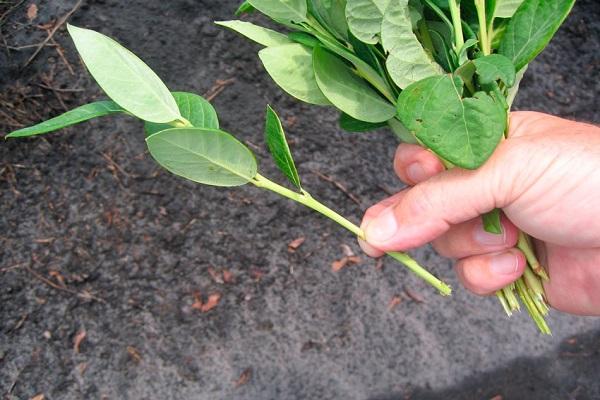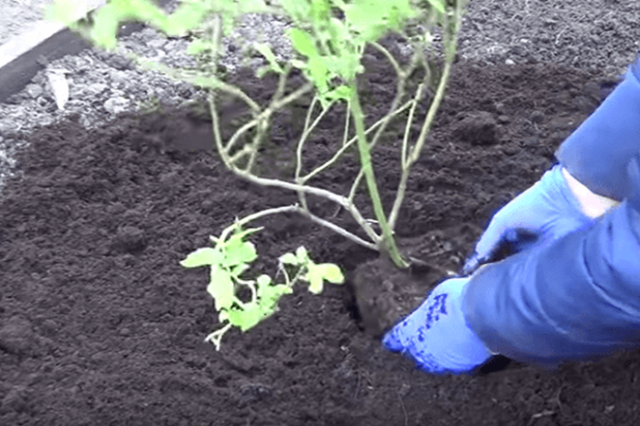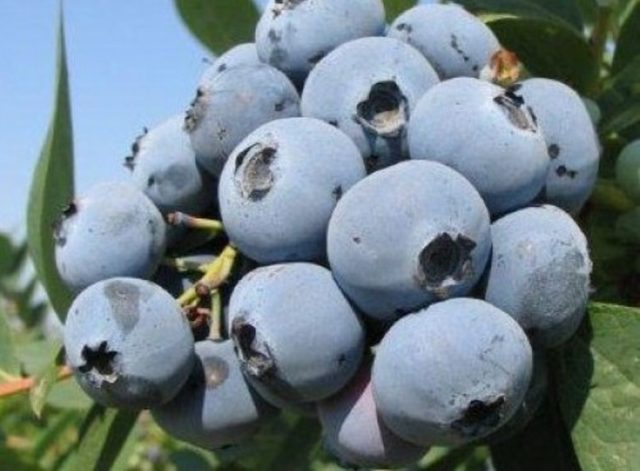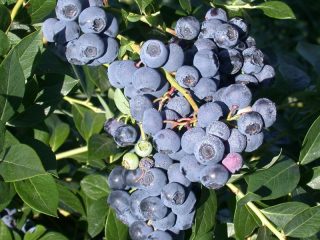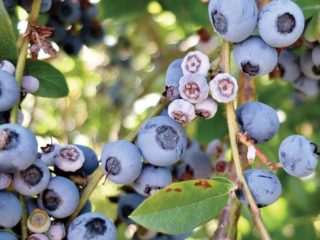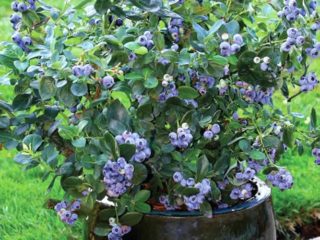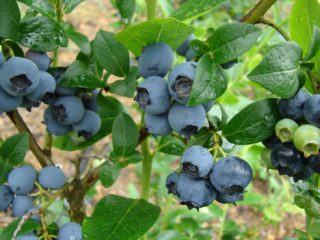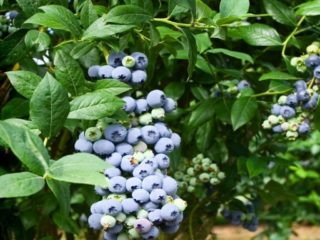Content
Erliblu blueberry is a variety of berries that are distinguished by early ripening, pleasant taste and content of a large amount of nutrients. The variety was included in the State Register of the Russian Federation in 2005, and is distributed not only in Russia, but also in Belarus. It first appeared in North America in the middle of the last century.
Description of Erliblu blueberries
Erliblu blueberry is a medium-sized variety. The main varietal features of the culture are early fruiting, resistance to frost and powdery mildew.
Features of fruiting
The Erliblu variety is self-fertile. Therefore, it needs cross-pollination. To do this, planting several different bushes of culture is necessary on the site. The main thing is that the flowering dates of the selected varieties coincide (early July), this will ensure early ripening of Erliblu blueberries, improve the quality and quantity of fruits.
Blueberry stems are reddish in color and grow up to 2 meters in height. The bushes do not form a large number of shoots, therefore they do not need constant pruning and thinning. The culture is also grown as an ornamental plant.
The fruits of the shrub have a sweet and sour taste and contain a large amount of vitamins. During the season, about 5 - 7 kg of berries can be harvested from the bush, and with special care, the indicators can reach 9 - 10 kg. The berries themselves weigh about 2 g, but do not fall off even when fully ripe.
The keeping quality of fruits is low - no more than 20 days, so the berries cannot stand long-term transportation. In this regard, after harvesting the berries, it is preferable to process or freeze.
Advantages and disadvantages
Garden blueberry Erliblu is a storehouse of vitamins and useful microelements, as well as a berry with excellent taste. But it also has its advantages and disadvantages.
Among the positive features of the variety, the following can be noted:
- early maturation;
- pleasant taste;
- frost resistance;
- ease of care;
- immunity to powdery mildew.
The disadvantages include:
- fastidious attitude to soil quality;
- low level of transportability of berries;
- extended period of fruit ripening.
Breeding features
The Erliblu blueberry variety can be propagated by cuttings, seeds and cuttings. Seed propagation in summer cottages is not used, since it is a rather laborious and time-consuming process.
Layers are also rarely used for propagation, only under the condition of experience in breeding the variety in a similar way.
Cuttings are the main breeding method for blueberries. Shoots suitable for planting grow from buds formed on semi-lignified and woody cuttings.
Wood cuttings must be prepared in the winter by collecting several branches in a bunch. They must be stored in a cellar or refrigerator.
And semi-lignified branches are cut in the middle of summer, after which they are immediately planted in the soil, resorting to watering with special preparations that stimulate growth.
Planting and leaving
Erliblu undersized blueberry is a variety that is distinguished by its unpretentiousness. The main rule of growing is the correct planting of the crop.
Recommended timing
The best times to plant Erliblu blueberries are spring and autumn.Before planting in any season, it is recommended to soak the seedlings in water so that they can be saturated with moisture for 10 to 20 minutes. After that, the root system should be kneaded a little. All this contributes to oxygenation of the roots.
Site selection and soil preparation
In order for the seedlings to take root well, it is necessary to select high-quality soil for them. Erliblu is a blueberry that prefers soil, the acidity of which ranges from 3.5 to 4.5 pH. To give the desired acidity, peat, sawdust, foliage and other materials are used.
Erliblu does not tolerate increased moisture, therefore, the variety should not be planted in wetlands and on clay soils. If water stagnates in the soil, the roots of the blueberry will begin to rot and die off.
Erliblu prefers sunny places, but the shade can cause a decrease in yield and nutrients in berries.
Landing algorithm
Planting of seedlings is carried out in prepared holes, the width and depth of which is 50 cm, and the distance between them is at least 1.5 meters. They are filled with a substrate with the required acidity level.
Blueberry planting can be done in a variety of ways.
The first option is on the comb:
- You need to dig a trench 10 cm deep and 100 cm wide.
- Pour the substrate into it to form a small mound.
- Plant a blueberry bush.
- Drizzle.
The second option is wells:
- Make a trench or pit, the width of which will be at least 80 cm, and the depth - 40 cm.
- Pour the prepared substrate there, flush with the soil.
- Plant blueberries.
- Shed.
The third option is containers:
- Prepare a special container (you can use plastic and wooden containers).
- Make several holes in it.
- Cover with suitable soil.
- Dig the container into the ground (you can not deepen the container completely, the main thing is that it is stable).
- Plant a blueberry bush.
- Drizzle.
Planting Erliblu in containers is preferable because it is easier to provide the plant with the right quality soil.
Growing and care
In order for Erliblu blueberries to look no worse at their summer cottage than in the photo, they need to be grown correctly. The culture needs feeding, regular watering, pest control and rare pruning.
Watering schedule
Since the yield of Erliblu blueberries is completely dependent on the level of moisture in the soil, watering must be treated responsibly. The variety does not like stagnant moisture at the roots, but it also does not tolerate drought. Therefore, the schedule for watering the bush must be strictly observed.
Experienced gardeners recommend spilling the shrub twice a week. Moreover, every day there are two waterings - in the morning and in the evening. The amount of water is determined by the condition of the soil and the amount of precipitation. The average volume for each bush is 1 bucket at a time.
Feeding schedule
Top dressing is one of the most important factors in the cultivation of blueberries, since the culture is demanding on the acidity of the soil, and if the standards are not observed, it can die. This variety must be fertilized according to a specific schedule:
- Mineral fertilizers are applied in the spring.
- Nitrogen preparations are added in June, July and August.
- Phosphorus is applied in mid-summer and early autumn.
The main signs that a plant needs acidification of the soil are yellowing and dry foliage. The situation can be changed both with specialized preparations and by adding sulfur, ammonia, citric acid powder (25 g per 5 liters of water) to the soil.
Pruning
Annual pruning is not required for the variety.To maintain health, the shrubs are sanitized, starting only from the 3rd year of blueberry life. For this, dried and diseased bushes are removed. To add decorative effect, root growths can be cut off.
Preparing for winter
Since one of the distinguishing features of Erliblu blueberries is that they belong to varieties with a high level of frost resistance, the culture does not need special preparation before winter.
The only exceptions are regions, the climate of which is considered harsh, and frosts reach -40 degrees. In this case, it is recommended to erect a bush shelter. To do this, use bark or needles, non-woven fiber.
Pests and diseases
Among the diseases to which blueberries of this variety are susceptible, there are both fungal and viral pathologies:
- mummification of berries;
- gray rot;
- black spot;
- stem cancer;
- anthracnose.
Among pests, most often only birds become enemies of the culture, from which the bush just needs to be covered with a net.
To prevent the development of diseases, it is necessary to use special preparations with which blueberries are processed at the very beginning of spring.
Conclusion
Erliblu blueberry is a variety that can please with juicy tasty berries already in July. At the same time, the berry does not require special care. The main thing is to follow the planting rules, monitor the acidity of the soil and water and fertilize the crop in a timely manner.
